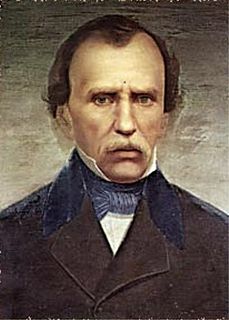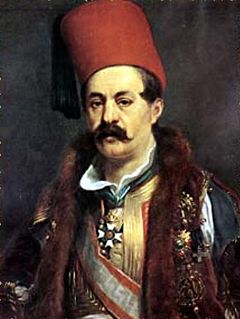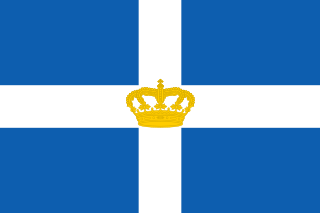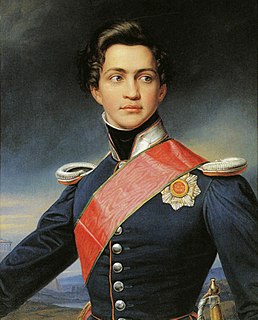
Bulgaria elects on national level a head of state - the president - and a legislature. The president is elected for a five-year term directly by the people. The National Assembly has 240 members, elected for a four-year term by proportional representation in multi-seat constituencies with a 4% threshold. Bulgaria has a multi-party system, in which no one party often has a chance of gaining power alone, and parties must work with each to form governments.

Dimitrios Kallergis was a fighter of the Greek War of Independence, major general, politician and one of the most important protagonists of the 3 September 1843 Revolution.

The First National Assembly of Epidaurus was the first meeting of the Greek National Assembly, a national representative political gathering of the Greek revolutionaries.
The Greek national assemblies are representative bodies of the Greek people. During and in the direct aftermath of the Greek War of Independence (1821–1832), the name was used for the insurgents' proto-parliamentary assemblies. Thereafter, the term has been used for a number of extraordinary assemblies chiefly in regard to changes in the Constitution and the form of government of Greece.
In the modern history of Greece, starting from the Greek War of Independence, the Constitution of 1975/1986/2001 is the last in a series of democratically adopted Constitutions.
Early Greek parties were not features of the provisional and regional governments that were set up between 1821 and 1832. Nascent political parties were organized around a variety of interests and backgrounds, but regardless of these various factors, the political formations were named after one of the three Great Powers that established the Kingdom of Greece in 1832.
The French Party, presenting itself as the Constitutional Party, was one of the three informal early Greek parties that dominated the early political history of Modern Greece, the other two being the Russian and the English Party.
Constitutional Assembly elections were held in Bulgaria on 10 June 1990, with a second round for eighteen seats on 17 June. They were the first elections held since the fall of Communism the previous winter, and the first free national elections since 1931. The elections were held to elect the 7th Grand National Assembly, tasked with adopting a new (democratic) constitution. The new electoral system was changed from 400 single-member constituencies used during the Communist era to a split system whereby half were elected in single member constituencies and half by proportional representation. The result was a victory for the Bulgarian Socialist Party, the freshly renamed Communist Party, which won 211 of the 400 seats. Voter turnout was 90.3%.
The Greek War of Independence was marked by two civil wars, which took place in 1824–1825. The conflict had both political and regional dimensions, as it pitted the Roumeliotes and the Islanders, against the Peloponnesians or Moreotes. It divided the young nation, and seriously weakened the military preparedness of the Greek forces in the face of the oncoming Egyptian intervention in the conflict.

Parliamentary elections were held in Turkmenistan on 11 December 1994. All 50 seats were won by the Democratic Party of Turkmenistan, the only party registered prior to the elections, with only one of the 50 constituencies being contested. Voter turnout was 99.8%.
Parliamentary elections were held in Greece on 16 December 1843. The elected body was also tasked with drawing up a constitution, following the 3 September 1843 Revolution. The Three-Party Coalition won almost half the seats in the 243-seat Chamber.
Parliamentary elections were held in Greece in June 1847. Supporters of Ioannis Kolettis won a majority of the 127 seats. However, he remained Prime Minister only until his death 17 September, after which Kitsos Tzavelas assumed office.
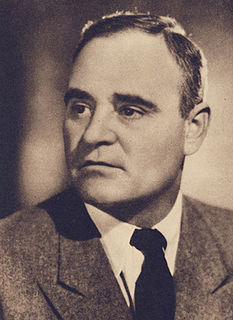
Parliamentary elections were held in Romania on 30 November 1952. They were the second held under undisguised Communist rule, and the first under a constitution adopted that September. Voters were presented with a single slate of candidates from the People's Democratic Front, which was dominated by the Romanian Workers Party. The Front won all 428 seats in the Great National Assembly. This election set the tone for all elections held in Romania until 1989. For the remainder of the Communist era, voters only had the choice of approving or rejecting a Communist-dominated list.
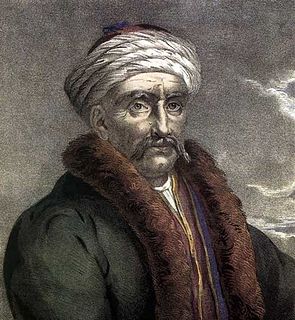
Panoutsos Notaras was a leading figure of the Greek War of Independence, serving several times as president of the Greek national assemblies and legislative bodies.

Dimitrios Christidis was a Greek politician and economist. He served as Speaker of the Hellenic Parliament, Minister of Finance, Minister of Internal Affairs, Minister of Foreign Affairs and Minister of Justice. He was a Senator (1846–1851) and advisor to the State Council established by the Greek Constitution of 1864. He was elected several times as member of Parliament for Syros (1847–1877).
A number of different and competing administrations used the name Administrative Committee(Greek: Διοικητική Επιτροπή) throughout 1832, each claiming responsibility for a different part of Greece, all after the dissolution of the Administrative Committee of 1831 of Augustinos Kapodistrias, Theodoros Kolokotronis, and Ioannis Kolettis

Parliamentary elections were held in Portugal on 8 and 17 October 1826.

